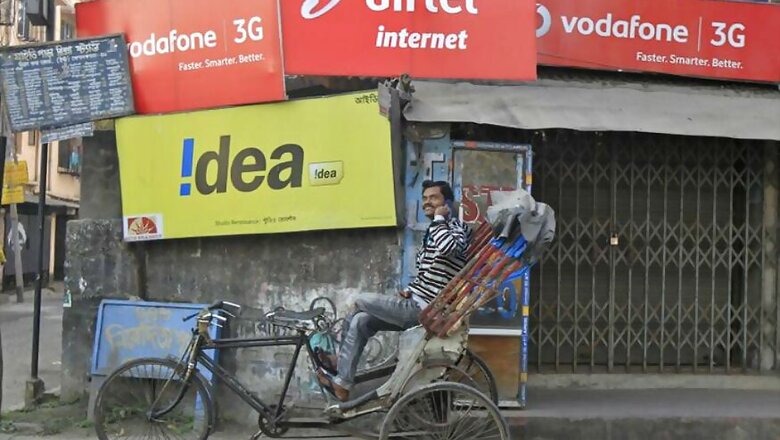
views
How real is the financial stress in the telecom sector? This question crops up whenever there are issues related to penalties, Interconnection Usage Charge (IUC), or licence fee payment dues from the incumbent telecom operators. The industry association has again started crying for a relief package from the government in view of the Supreme Court verdict upholding the Department of Telecommunications’ (DoT) claim on recovering licence fee from operators.
The total dues on two incumbent players – Bharti Airtel and Vodafone Idea – is about Rs 90,000 crore to be paid in three months. The industry association is lobbying for a package from the Committee of Secretaries (CoS), set up under the Cabinet Secretary, to study the reported stress in the telecom sector.
The CoS should first investigate why these companies have high debt. Then the next question the CoS should ask is whether there is any financial stress in the sector or it is just another arm-twisting tactic to extract more money from the government?
It may be noted that officials of at least one of these companies have informed its investors that the company is in a position to pay the dues. However, its promoter met the minister seeking relief!
Interestingly, Bharti Airtel’s market cap has increased more than 30% in the past year and at about Rs 1.9 lakh crore, it is one of the most valuable companies in India.
What is the case related to AGR?
In 1999, the government gave a relief package to the telecom operators who could not pay fee for licence (that came along with 4.4 MHz of spectrum) that they got through auction as they were under “financial stress”. They were migrated from a fixed licence fee to a revenue share regime under which they had to pay a percentage of AGR as annual fee.
“However, the telecom service providers in spite of the financial benefits of the package started to ensure that they do not pay the licence fee to the public exchequer based on even an agreed ‘AGR’,” said a bench of Justices Arun Mishra, S Abdul Nazeer and MR Shah.
“The definition of gross revenue is crystal clear in the agreement. How the adjusted gross revenue is to be arrived at is also evident. It cannot be submitted that the revenue has not been defined in the contract. Once the gross revenue is defined, one cannot depart from it,” said the bench.
What is important is that no one forced the telecom operators to migrate from fixed licence fee to revenue share regime. At the time of migration, AGR was clearly defined in the agreement.
“When the government has parted with the privilege as to revenue on sharing basis under the licence, and an agreement entered into, it ought to have been precisely followed. The conduct of the licensees was highly unfair, and anyhow and somehow, they had attempted to delay the payment,” said the apex court.
CoS should investigate the reason and cause of financial stress
By maintaining a “financial stress” narrative since 1999, telecom operators have got relief of lakhs of crores at the cost of taxpayers. Once they got relief, the revenue and profitability of telecom companies rose in value. This allowed promoters to sell their equity and make personal wealth.
While there have been stories of financial stress all along, the telecom sector has also spawned a number of billionaires. For instance, the Ruia brothers made $5 billion when they sold their shares to Vodafone in 2011, while Chinese business tycoon and Hutchison promoter Li Ka-Shing sold his equity to Vodafone for $11 billion in 2007. Rajeev Chandrasekhar, Analjit Singh and C Sivasankaran are among other telecom billionaires who sold their telecom companies. Bharti Airtel chairman Sunil Mittal has a net worth of $8.1 billion.
Capacity of existing operators to pay dues
Currently, there are mainly two incumbent operators - Idea Vodafone and Airtel. Even before the judgement came, Vodafone Idea had been seeking a relief package from the government. It wants taxpayers to compensate for its bad business decisions. The company has a debt of about Rs 1.3 lakh crore and its losses for the first quarter for the current fiscal year was about Rs 4,900 crore. Its Indian promoter has been telling government officials that it would close down if it is not given a relief package. It wants an increase in Interconnect Usage Charge (IUC) and moratorium on payment of licence fee.
If a company is in such a bad financial condition and wanted taxpayers’ support to continue its services, then it would have closed down its operations even if there was no Supreme Court judgement. In any case, Vodafone is one of the largest and financially strong telecom service providers in the world. When the two companies merged, Vodafone must have indemnified Idea Cellular. So, it is in a position to pay legitimate licence fee dues.
Similarly, Bharti with a market cap of about Rs 2.3 lakh crore for its two companies – Bharti Airtel and Bharti Infratel - can easily pay the dues.
(The writer is the editor of TelecomTiger. Views are personal.)




















Comments
0 comment